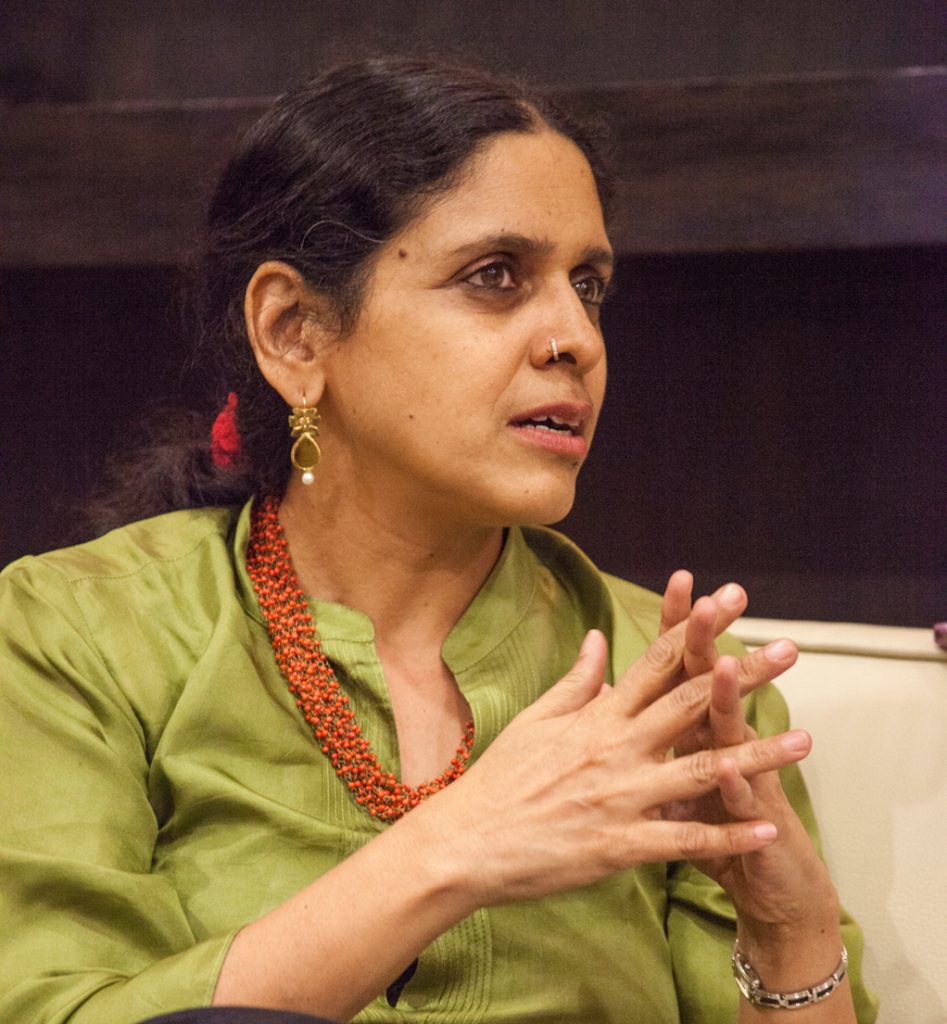Feminist Frames for a Brave New Digitality
Anita Gurumurthy & Nandini Chami
The excesses of intelligence capitalism present an unprecedented urgency to reimagine sociality and reinvent the institutional architectures for a new world. We need to revitalize our theories of agency, social subjectivity, and planetary wellbeing; revamp the norms and rules that determine rights; and revisit the political practice of feminist solidarity. Our sense-making frames cannot afford a nostalgia about human supremacy. They must recognize non-human materialities, putting an environment in which all matter share existence, front and centre. This will allow us to revisualize personhood and social subjectivity through a relatedness with natural ecosystems and technological artefacts. Current institutional norms are woefully inadequate, unable as they are to tackle a totalizing intelligence capitalism. The digital paradigm must be (re)claimed through a post-individualist, anti-patriarchal, decentralized and anti-imperialist institutional framework. What we need are norms for a collective claim to data and a political commitment to systematically scrutinize the social identity of AI systems. Feminist efforts to build community and forge publics are entrapped in the dominant communicative arenas of the digital that instrumentalize and co-opt political subjectivity. Through a self-reflexive place-making that visibilizes the often-illegible practices of community and solidarity and embraces cross-fertilizations, feminism can lead the way for emancipatory posthuman futures.




Crisis at the digital turn
As feminism and its radical propensity confronts the digital epoch, the Covid conjuncture provides a stocktaking moment for revisiting the human condition. It allows us to contemplate the meta frames that must guide us into a just and egalitarian future, providing an occasion to sharpen our epistemic toolkit and explore what a transformative being and becoming in digitality – the condition of human-digital hybridity – means.
The story of connectivity and access seems to have lost its once-impassioned urgency and emancipatory potential. The market for gadgets has reached an equilibrium adequate for capital’s continuing conquest through datafication of human sociality. The gadgetless or unconnected, such as indigenous people, are perhaps not as important for the corporate data machine as the ecosystems they inhabit. As for the dispossessed others like wage workers, their lives are anyway being captured by cameras, internet of things (IoT), and automated decision-making technologies generating the data to categorize and convert them into ‘bottom-of-the-pyramid’ markets for ever-expanding product ‘innovations’.
The production of capital in the digital epoch may be seen as the stage of ‘intelligence capitalism’. Enclosing the data it ceaselessly collects and accumulates, and deploying its data enclosure for honing an ‘intelligence advantage’, digital age capitalism ruthlessly eliminates competition to aggrandize value on the network. The capitalist data machine commoditizes information not only to produce economic value, but also to control ‘bios’ or life to a more intensified degree than before. In the current form of capitalism, therefore, “life itself is the main capital”.1 The data gold rush is the new imperialist frontier – a Leninist territorial capture by force for capitalist interests. Only that, coercion today is achieved by stealth, as the self and society are folded into intelligence capitalism through digitally-surveilled motions of the everyday.
The digital’s inherent propensity for deterritorial communications has worked well for the new global feudals – big platform companies – and their business models. Erasing the materiality of embodied labor and eradicating the relationality of care, intelligence capitalism decouples social reproduction from production. A regime of despotic control reigns over digital production chains, atomizing labor power and normalizing precarity. A pronounced asymmetry is evident in the neo-colonial division of labor within which gendered and racialized categorizations determine the very promise of freedom.
The economy of “life as surplus”,2 feeding on incessant profiling, displaces critical agency and radical subjectivity, cannibalizing diversity. The ‘data subject’ is but a proxy for the proliferation of differences as the engine of commodification in our quantified environments.
In the wild west of intelligence capitalism, rule-making is privatized and legitimized through platform as protocol and AI as law. Institutions of norms-setting and rule-making have been rendered ineffectual, and even irrelevant, with the data lords determining visions and meanings of development, democracy, human rights, trade, and peace and security.
So goes the digital tale. A compelling contemporary myth that is a far cry from Haraway’s cyborgian vision for a feminist future that can vanquish “an informatics of domination”.3
The digital turn signals an urgency to reimagine sociality and invent the institutional architectures of a new world. We need to revitalize our theories of agency, social subjectivity, and planetary wellbeing; revamp the norms and rules that determine rights; and revisit the political practice of feminist solidarity.
From a feminist standpoint, this reality is untenable. The digital turn signals an urgency to reimagine sociality and invent the institutional architectures of a new world. We need to revitalize our theories of agency, social subjectivity, and planetary wellbeing; revamp the norms and rules that determine rights; and revisit the political practice of feminist solidarity.
Towards this, our essay proposes an epistemic triumvirate of sense-making, claims-making and place-making as the basis of such renewal.
Sense-making – Embracing the posthuman condition
There are no essential differences or absolute demarcations, between bodily existence and computer simulation, cybernetic mechanism and biological organism, robot technology and human goals.
– N. Katherine Hayles4
The binaries of data and body, human and technology, often lead us to essentialisms – a dystopic bemoaning of datafied destiny in intelligence capitalism or utopic readings of AI as the magic wand for ‘human’ advancement. Moving away from such dead ends, feminist political action must find a theoretical portal for liberation that allows for greater complexity.
Feminist theorists like Donna Haraway, Rosi Braidotti, and Katherine Hayles reject these tight boundaries and dualisms. They question the category of the autonomous, liberal, human subject who stands apart from non-human others.5 Asserting the inseparability of mind and matter, they propose a ‘posthuman’ systems framing. Posthumanism contends that with digital technologies, the embodied mind becomes distributed across multiple terrains of hyperconnection and hyperpersonalization. The posthuman person is hence a complex, material-informational entity, constantly being (re)constructed.6
This is not to suggest a loss of humanity, but a shift in the way we understand nature and the hybrid lives we lead. In the continuous interaction with electronic devices, the human person does indeed embody agency; however, agency is now reconfigured. It is distributed and interactive. Human agency correlates with the distributed cognitive system as a whole, in which ‘thinking’ is done by human and non-human actors.7
As an eco-philosophical approach, feminist posthumanism also theorizes a seamlessness between subject and object, subjectivity and ecology – an inter-connectedness between all matter – “that locates the subject in the flow of relations with multiple others”.8 Feminist posthuman theorists thus underline a post-anthropocentric perspective on the environment. The ‘environment’ is not only the context for human agency, but the arena for the production of the entirety of both ‘natural’ and ‘social’ worlds. There is nothing beyond environment, and nothing (for instance, humans and their diverse cultures) is excluded from it.9
Why is the posthuman frame important to our actions?
To marshal the vision and action adequate to a sustainable future that is cognizant of the limits of anthropocentricism and the false idea of a singular, undifferentiated humanity, the conceptual frames we deploy must explain the structures of power and domination. In posthumanism, things and persons, nature and technology, virtual and real are entangled in a complex whole. Our evolution towards the posthuman condition, as Braidotti reflects, is a stage of crisis under the ‘capitalocene’ – how capitalism in the digital technological conjuncture informs and subordinates the possibility of thinking about what a human is to an excessive extent.10 Arranging and ordering human beings as risky/non-risky, deserving/undeserving, valued/disposable and so on, capitalist data regimes construct and reconstruct the materiality of bodies through control, colonization, and exploitation. They hold subjectivity hostage.
But nostalgic assertions harking back at human supremacy and a disavowal of AI may end up denying “social ontology” at the digital turn.11 Such nostalgia will prevent the crystallization of institutional ethics appropriate and adequate to the posthuman condition. Non-human materialities are bona fide participants within events and interactions, rather than recalcitrant objects, social constructs, or instrumentalities.12
Our task, therefore, is to dismantle disempowering relationalities, revisualizing personhood through an ethics of connection – with natural ecosystems, robots, AI, and the material others that make the whole of our existence. Displacing the oppressive regimes of data governmentality in dominant computational systems, our action must situate itself in the quest for a new sensibility, mobilizing new modes of social subjectivity.
Claims-making – defining network-data freedoms
The overlap in the sociopolitical circumstances of human and artificial agents is not predicated on some shared biological or ecological background, nor on shared experiences or conscious states, but more concretely on the material and institutional realities within which human and nonhuman agents “share existence”.
– Bruno Latour13
Articulating how rights arise in the relationality of matter – human and nonhuman – in shared digital destiny is a vital feminist task. Indeed, time-space contingencies or ‘the contextual’ must occupy a salient place, but it must be colinear with a common baseline, that is, ‘a shared vision’, for emancipatory personhood. A shift from liberal constructs of the human in human rights is urgently needed to reimagine the idea of rights through a posthuman institutional ethics.
What this entails – stepping beyond human-centric ideas of solidarity, social justice, and equality – is a planetary ecosystem focus.14 The ways in which capitalism, state, patriarchy, imperialism, and white supremacy have historically required control over bodies and nature, need to be the starting point in this quest for new rights.
How do we then begin to articulate the substance of digital rights, or more broadly, network-data freedoms for an expanded personhood?
Intelligence capitalism is a totalizing, imperialist force. People and planet, machines and code, are subordinated in digital value chains, their agentic propensities exploited and extracted for profit. From rare-earth mining in Congo, chip production in Asia, affective and intellectual labor in the digital economy, mass deployment of surveillance paraphernalia by states to bio-piracy and bio-prospecting through digital gene sequencing, and AI modelling meant to discriminate and destroy, the pan-global digital ecosystem emboldened by finance capital has unleashed a disciplinary regime that has seen an erosion of personhood and the evisceration of planetary wellbeing.
Institutional norms are at a crossroads. Not unlike the post-war crisis that birthed the human rights regime, the world polity today is at a hairpin bend. A post-democratic complacence is sweeping across state institutions, while the global multilateral system is occupied by imaginations of ‘sustainable development’ that valorize a capitalist future through the tropes of equality, inclusion, opportunity, innovation, and progress. Humanist ideals in global justice have been used to defend the very practices that subvert it.
The digital needs to be reconceived in post-individualist, anti-imperialist, anti-patriarchal terms. The myth of data as a disembedded, non-rivalrous, ever-flowing resource obfuscates the systemic relationalities of the network-data-nature-culture assemblage in intelligence capitalism. Not only must these relationalities be opened up in order to question what data may be “dematerialized”15 from human and non-human matter, under what conditions, towards what gains, and for whom, data materiality itself must also be continuously examined in relation to historical markers – race, gender, class, caste, geography, and more.
A post-individualist framework is needed for claims about data that will account for how embodification online and the processes through which data becomes intelligence are evaluated for physical, material, and non-material implications.
A post-individualist framework is needed for claims about data that will account for how embodification online and the processes through which data becomes intelligence are evaluated for physical, material, and non-material implications.16
This does not mean a negation of personal rights, but rather, an attempt to inscribe the social with the possibilities for an authentic posthuman personhood. Privacy rights based on individual consent have proven to be ineffectual at best and harmful at worst, with corporations acting as de facto mediators of informational claims in which the body is embedded. The structural implications of loss of privacy for minority communities in derived datasets (when identities reappear) have been the subject of much study.17 A reification of personhood in the form of, for example, privacy rights as a boundary against things or abuse of commoditized data is unlikely to solve the social or collective crisis of corporatized data control.18
The corollary of this is that extractive regimes of data as private enclosures will need to make way for a different institutional framework for data’s “rematerialization”19 so that datafied relationalities can (re)produce critical, agentic personhoods for thriving nature-culture-techno ecosystems.
Non-Western ontologies provide important points of departure – locating humans as integral to ‘environment’,20 and underscoring new visions for conceptualizing human-digital assemblages. They suggest alternative ideas of data materiality where relationality and “belonging” (of part with the whole) rather than “exclusionary rights” (between subject and object)21 can become the basis of claims. The notion of the data commons – increasingly gaining ground in digital rights theory and activism – has the radical potential for an ecosystem approach to data resources. By situating data within the very same natural-social environment in which humans share space, this approach allows for explorations of collective claims that adhere to shared ethics and norms. It alerts us to the possibilities for posthuman personhood that can bring forth post-anthropocentric, legal-institutional framings of the digital.
As Sarah Keenen observes, “property’s governmental power reaches beyond the subject, determining not only what belongs to who, but also who belongs where, and how spaces of belonging will be shaped in the future”.22 Left to itself, data’s commoditization is bound to (re)create a disciplinary order that is brutal in its alienation and destruction. In elaborating the ideas of the data subject, therefore, legal-institutional visions must legitimize the claims of marginal subjects, ensuring a place for them in the future. Claims need to be reimagined as potential posthumanist rights.23
The institutional aspects of data also need to consider personhood as is constituted in the interplay between human and non-human parts of global intelligent ecosystems. Whether AI, for instance, has consciousness or sentience is the wrong question here. The fact is that, in the digital moment, thinking and embodiment are distributed. They are entangled in structures of power that need to be made known. Daniel Estrada points to how Kiwibots, a start-up offering food delivery through robots – rather than using AI software to control its bots – farms out the control task to low-paid operators in Colombia who use GPS to direct the bot to its destination. Kiwibots provides an interesting case at the intersection of automation, teleoperation, and the global labor market that challenges the strict dichotomy between humans and machines. In this digital ecosystem, instrumentalizing the robot as ‘the slave’ would amount to “indirectly treating another human as a slave, with many of the same structures of exploitation and oppression the term invites”.24 The right question for ethical policy, therefore, is – how should robotic/AI agency co-construct social subjectivities?
An institutional framework for AI must recognize overlapping structures of oppression that situate digital things – data pools, databases, networks, AI systems, cameras, internet of things, robots, cloud architectures – as agents of power. Feminist data and AI scholarship is replete with analyses of the subordination and violence implicit in the gendering and racialization of bots.25 Scholarship also points to the denial of personhood through state control of marginal citizens through real time surveillance.26 The “social identity” of robots and AI must therefore be available for public inspection.27 Put differently, posthumanist frames of justice include a morality for the non-human world, opening up intelligence and bodies cohering in the form of automated code to political scrutiny and renewed imaginings.
The claims of local actors resisting the multiple tyrannies of oppression cannot materialize unless the international political economy of development discourse and rule-making are challenged fundamentally. The right to participate as full persons in network-data assemblages is for all individuals and collectivities. It cannot fructify in the current trajectories of corporate-led, imperialist, undemocratic global systems that co-opt and control the digital. Quite ironically, the institutions of international human rights law had discovered the posthuman category when, from the beginning, capitalist interests were combined with human rights, and the corporation deemed a person.28 The future of rights and justice depends on destabilizing these realities for a transformative “ecological potential”.29 We need collective, decentralized and anti-imperialist imaginaries to govern the network and data that can enable a thriving of diverse posthumanist assemblages.
Place-making – Constructing feminist publics
We need to understand the body not as bound to the private or to the self – the western idea of the autonomous individual – but as being linked integrally to material expressions of community and public space. In this sense there is no neat divide between the corporeal and the social; there is instead what has been called a ‘social flesh.’
– Wendy Harcourt and Arturo Escobar30
At the heart of intelligence capitalism is the impulse that produces ever-multiplying differences. A post-feminist valorization of narcissistic individuality feeds the network-data complex with likes, forwards, retweets, and more, individualizing feminism and flattening it into a proliferating, universal hashtag culture of performativity. To be in the network is to model the self on its logic. The feminist subject in the current conjuncture, therefore, emerges as an active, freely choosing, and self-reinventing persona, unaffected by structural constraints.31
While the internet revolutionized the creation and construction of community and solidarity, changing the very scale and space of feminist politics, its evolution in intelligence capitalism complicates feminist place-making. It draws the self and subjectivity into a depoliticized space, obliterating socio-structural hierarchies. Algorithmic cultures of platform publics accommodate radical identity-based politics, cannibalizing them into “a market-driven and state-sanctioned governmentality of diversity” that Chandra Talpade Mohanty critiques in her reflections of minority struggles in current neoliberal times.32 She points to how questions of oppression and exploitation, as systematic, institutionalized processes, have difficulty being heard when neoliberal narratives disallow the salience of collective experience or redefine this experience as a commodity to be consumed.33
Tragically, the embodied experience of digitality is as much an embedded product of the structures of oppression and exploitation, including, race, caste, disability/ability, age, gender, sexuality, geography etc., as in previous epochs. Activists and feminist rights organizations have documented the extreme violence that women and people of non-normative gender identities and sexualities face in the design architectures of online publics, geared to encash viral outrage, literally.34
The online space of flows privileges certain bodies and narratives, even as it eclipses and sidesteps others incongruous with the demands of its political economy. Attempts to perforate pop culture with feminist strategies are rewarded,35 and publics adopting playful modes of resistance or meme cultures encouraged. The bodies of women of colour – even if legible – are often “relegated to metaphors”,36 while locations of race, gender, class, nation, empire, sexuality acquire a post-intersectional grammar that is unified in various combinations for the market. The contradictions in feminist ontological assumptions are rendered irrelevant.
For feminist action then, the current posthuman condition presents a persistent tension between critical, radical subjectivity and online communicative publics. How do we call out and resist oppression when its experience is coded into the self-propelling logic of the network space? How can feminist publics, implicated as they are in the material architectures of intelligence capitalism, rescue themselves?
Feminist practice needs a reflexivity that can account for the legibilities coming from the interpretative power of certain types of politics, and the erasures of certain others, both tied to the logics of the network-data complex. This will allow us to discern and politicize less visible feminist practices that are resisting the ravages of capital, demonstrating how community and solidarity in the transnational moment are conceived and enacted in a global frame for a global citizenship.37 The radical politics of such place-making – embedded (locally/in the particular) yet connected (translocally/through human-digital assemblages) – share a vision for an alternative democratic global order. These visions seek to make public the systemic basis of oppression, and the multifarious sites of resistance from where women farmers, indigenous women protesting the brutal exploitation of their ecological resources, persecuted women from minority religions laying claims to citizenship, trans and queer women, disabled women, and the new precariat on digital value chains – are collectively asserting their right to be heard.
Feminist place-making is not merely about creating the site/s for free play of multiple subjectivities. It is about deploying the public arena in the digital moment as a constitutive element in subjective identification itself.
These resistance narratives tell us what it means to create a place, or indeed, a tapestry of places, that can be part of multiscalar frames of feminist action. The notion and practice of solidarity needs to be recovered from assumptions of universal, templatized, global publics that dilute, discipline, and disarticulate counter-hegemonic knowledges. However, as Mohanty points out, this cannot be to the neglect of the structural.38 Questions of imperialism and capitalism resurgent in the political economy of the digital are central to how political feminisms of today carve out the material spaces of resistance – online and offline – and can provide a global frame for building solidarity.
Therefore, in the context of intelligence capitalism, our interest lies in continuously unpacking how the institutional context of the online communicative arena functions; how communicative publics are reproduced through dominant relationalities (including platform ownership, design, protocols, and governance); how ‘individual experiences’ may be traced back to the systems that (re)produce them (and vice versa); and how communicative arenas of the digital are themselves in constant interaction with dominant ideologies, and historical structures of oppression, exploitation, cultural norms, legal rules and ruling institutions, all (re)producing one another.
Feminist place-making is not merely about creating the site/s for free play of multiple subjectivities. It is about deploying the public arena in the digital moment as a constitutive element in subjective identification itself.39
Emerging through new alliances to decolonize, detabilize, and discover, feminist actions for a new digitality must forge cross-fertilizations that include indigenous and First Nation peoples, environmental and digital rights activists, technologists, anti-globalization forces, and several others.
A brave new feminist digitality
The posthuman is not postpolitical. The posthuman condition does not mark the end of political agency, but a recasting of it in the direction of relational ontology.
Rosi Braidotti40
An emboldened capitalism riding on digital highways and data power confronts twenty-first century feminism. Its instinct for survival and intuition for opportunism have been laid bare in these surreal times of the global Covid pandemic. The personal wealth of the Big Tech monarchs has gone up even as the world registered heightened inequality and hunger.
A recalibration of our politics is not a matter of choice. A new deal must be clinched and the ‘informatics of domination’ overthrown. Digital and data technologies are not extraneous objects. They are agentic entities in the ecosystems we inhabit – of centralized power, imperialist control, and patriarchal superiority. But they need not be. Revisualizing personhood and reimagining an ethics and politics of connection, community and care, feminism must mobilize action appropriate to emancipatory posthuman futures on an array of fronts.
A recalibration of our politics is not a matter of choice. A new deal must be clinched and the ‘informatics of domination’ overthrown.
Who the future of promise belongs to depends on the political-institutional design possibilities that realign the nature-culture-techno present. This task is simultaneously about seeking transformative global norm-making for data and AI, as it is about a (re)socialization of subjectivity. New actions and coalitions will need to be forged along with unlike others not easily legible in the coercive politics of likeness we navigate in our techno-structures.
There is no room for nostalgic humanism. Our sense-making, claims-making and place-making strategies must account for an emergent reflexivity – ‘a becoming social’ – that can confront the digital devil in the detail.
It is time to ready the feminist arsenal for a humane and just digital epoch.
Notes
- 1 Kall, J. (2017a). A posthuman data subject in the European data protection regime. Making my data real working paper 4/2017. Retrieved from https://makingmydatareal.files.wordpress.com/2017/03/mmdr_kacc88ll_4_2017.pdf.
- 2 Cooper, M. E. (2011). Life as surplus: Biotechnology and capitalism in the neoliberal era. University of Washington Press.
- 3 Haraway, D. (2006). A cyborg manifesto: Science, technology, and socialist-feminism in the late 20th century. In The international handbook of virtual learning environments (pp. 117-158). Springer, Dordrecht.
- 4 Hayles, N. K. (2008). How we became posthuman: Virtual bodies in cybernetics, literature, and informatics. University of Chicago Press.
- 5 Käll, J. (2017). A posthuman data subject? The right to be forgotten and beyond. German Law Journal, 18(5), 1145-1162.
- 6 Delio, I. (2020). The posthuman as complex dynamical personhood: A reply to Hyun-Shik Jun, Social Epistemology Review and Reply Collective. Retrieved from https://social-epistemology.com/2020/04/15/the-posthuman-as-complex-dynamical-personhood-a-reply-to-hyun-shik-jun-ilia-delio/.
- 7 ibid.
- 8 Braidotti, R. (2013). The posthuman. John Wiley & Sons. pp 50
- 9 Fox, N. J., & Alldred, P. (2020). Sustainability, feminist posthumanism and the unusual capacities of (post) humans. Environmental sociology, 6(2), 121-131.
- 10 Braidotti, R. (2019). A theoretical framework for the critical posthumanities. Theory, culture & society, 36(6), 31-61.
- 11 Estrada, D. (2019). Human Supremacy as Posthuman Risk. Computer Ethics-Philosophical Enquiry (CEPE) Proceedings, 2019(1), 13.
- 12 Sundberg (2014, 33) cited in Fox, N. J., & Alldred, P. (2020). op.cit.
- 13 Latour, B. (2003). Do you believe in reality? News from the trenches of the science wars. Philosophy of technology: The technological condition, Blackwell Publishing Ltd, 126–137.
- 14 Braidotti, R. (2016). Posthuman feminist theory. Oxford handbook of feminist theory, 673.
- 15 Hayles, 1999 cited in Käll, J. (2017b). op.cit.
- 16 Käll, J. (2017b). op.cit.
- 17 Dencik, L., Hintz, A., & Cable, J. (2017). Towards data justice. DATA POLITICS, 167.
- 18 Kall, J. (October, 2020). The materiality of data as property. Retrieved from https://www.academia.edu/42843054/The_Materiality_of_Data_as_Property.
- 19 Hayles, 1999 cited in Käll, J. (2017b). op.cit.
- 20 Rosiek, Snyder, and Pratt (2019); Todd (2016) cited in Fox, N. J., & Alldred, P. (2020). op.cit.
- 21 Keenan, S. (2014). Subversive property: Law and the production of spaces of belonging. Routledge.
- 22 Keenan, S. (2014). op.cit.
- 23 Käll, J. (2017b). op.cit.
- 24 Estrada, D. (2019). op.cit.
- 25 Balsamo, A. M. (1996). Technologies of the gendered body: Reading cyborg women. Duke University Press.
- 26 Nayar, P. K. (2012). ‘I Sing the Body Biometric’: Surveillance and Biological Citizenship. Economic and Political Weekly, 17-22.
- 27 Brscić, Kidokoro, Suehiro & Kanda (2015); Romero (2018); Salvini et al. (2010); Smith & Zeller (2017) cited in Estrada, D. (2019). op.cit.
- 28 Baxi, U. (2009). Human rights in a posthuman world: Critical essays. Oxford University Press.
- 29 Fox, N. J., & Alldred, P. (2020). op.cit.
- 30 Harcourt, W., & Escobar, A. (2002). Women and the politics of place. Development, 45(1), 7-14.
- 31 Gill, R. (2007). Postfeminist media culture: Elements of a sensibility. European journal of cultural studies, 10(2), 147-166.
- 32 Mohanty, C. T. (2013). Transnational feminist crossings: On neoliberalism and radical critique. Signs: Journal of women in culture and society, 38(4), 967-991.
- 33 ibid.
- 34 Namita, A. (2017). Mapping research in gender and digital technology. Retrieved from https://idl-bnc-idrc.dspacedirect.org/bitstream/handle/10625/58151/58271.pdf?sequence=1.
- 35 Kauer (2009), cited in Baer, H. (2016). Redoing feminism: Digital activism, body politics, and neoliberalism. Feminist Media Studies, 16(1), 17-34. http://dx.doi.org/10.1080/14680777.2015.1093070.
- 36 EPW Engage (October 2020). Is ‘Intersectionality’ a useful analytical framework for feminists in India?, Retrieved from https://www.epw.in/engage/discussion/intersectionality-useful-analytical-framework.
- 37 Batliwala, S. (2002). Grassroots movements as transnational actors: Implications for global civil society. Voluntas: International journal of voluntary and nonprofit organizations, 13(4), 393-409.
- 38 Jibrin, R., & Salem, S. (2015). Revisiting intersectionality: Reflections on theory and praxis. Transcripts: An Interdisciplinary Journal in the Humanities and Sciences, 5, 7-24.
- 39 Harper, Phillip Brian. Gay male identity, personal privacy, and relations of public exchange: Notes on directions for queer critique. Eds. Harper, Phillip Brian, Anne McClintock, José Esteban Muñoz, and Trish Rosen. Social Text: Queer transexions of race, nation, and gender. 52-53 (Autumn-Winter 1997): 5-29.
- 40 Braidotti, R. (2016). op.cit.

Anita Gurumurthy is a founding member and executive director of IT for Change, where she leads research collaborations and projects in relation to the network society, with a focus on governance, democracy and gender justice. Her work reflects a keen interest in southern frameworks and the political economy of Internet governance and data and surveillance.

Nandini Chami is the deputy director of IT for Change. Her work largely focuses on research and policy advocacy in the domains of digital rights and development, and the political economy of women’s rights in the information society. She is part of the organisation’s advocacy efforts around the 2030 development agenda on issues of ‘data for development’ and digital technologies and gender justice. She also provides strategic support to IT for Change’s field centre, Prakriye.
